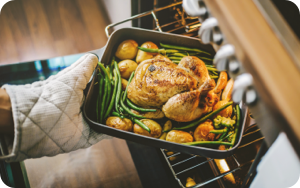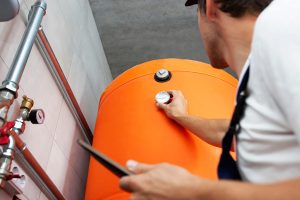The kitchen is the heart of the home, where we cook food, eat, and spend quality time with family and friends. However, a kitchen is also one of the most energy-intensive rooms in the house. From cooking appliances to lighting, there are numerous ways to make your kitchen more energy-efficient and save money in the process.
Discover our Top Eight Kitchen Energy Saving Tips:
- Choose energy-saving kitchen appliances
- Optimise your cooking methods
- Optimise your refrigerator and freezer
- Use energy-saving kitchen lights
- Consider smart appliances
- Properly maintain your kitchen appliances
- Be mindful of your dishwasher usage
- Insulate your kitchen
How to Save Energy in the Kitchen
1. Choose Energy-Saving Kitchen Appliances
When it comes to kitchen energy efficiency, a significant factor to consider is your choice of kitchen appliances. Look for energy-efficient models that have the ENERGY STAR label. This energy label indicates that the appliance meets strict energy efficiency guidelines. Overall, these appliances will consume less energy compared to their non-certified counterparts.
2. Optimise your Cooking Methods
Did you know that altering your cooking methods can help to minimise energy consumption? Here are some tips:
- Cover pots and pans while cooking to help retain heat and speed up the cooking process.
- If you have a convection oven, use it. Convection ovens circulate hot air, allowing for faster, more even cooking and reducing the overall cooking time.
- Consider using a pressure cooker for dishes that typically require long cooking times.
- Prepare meals in larger quantities and freeze portions for later use to reduce the need for cooking from scratch every day.
3. Optimise your Refrigerator and Freezer
Refrigerators and freezers are among the most power-hungry appliances in the kitchen. To save energy and money, make sure to seal your refrigerator and freezer doors properly. Regularly clean the coils on the back of your refrigerator to reduce the amount of energy used. Additionally, set the temperature to recommended levels: 37-40°F for the fridge and 0°F for the freezer.
4. Use Energy-Saving Kitchen Lights
Lighting plays a significant role in making your kitchen more energy-efficient. Traditional incandescent bulbs consume a lot of energy and generate excess heat. To create a more comfortable kitchen atmosphere, consider switching to energy-saving lighting options. We recommend opting for LED or CFL bulbs. These lighting options are more energy-efficient and have a longer lifespan, reducing the need for frequent replacements.
LED lights, in particular, are a popular choice for kitchen lighting. They come in various colour temperatures, allowing you to create the perfect ambiance while saving on your electricity bills. Additionally, consider installing dimmer switches to adjust the lighting intensity according to your needs, reducing energy consumption further.
5. Consider Smart Appliances
Smart appliances offer a convenient way to manage your kitchen energy efficiency. You can control these appliances remotely through apps, helping you make more informed decisions about energy usage. For instance, a smart thermostat can optimise your refrigerator’s settings based on your usage patterns.
6. Properly Maintain your Kitchen Appliances
People often overlook the importance of regular maintenance and cleaning of kitchen appliances. Dirty appliances and clogged filters have to work harder, using more energy in the process. Here’s what you can do:
- Clean refrigerator coils. Dust and debris on the coils make the refrigerator work less efficiently. Clean them at least once a year to maintain optimal performance.
- Clean your stove and oven. A clean stovetop and oven operate more efficiently, as grime and grease can interfere with the appliance’s heating elements.
- Clean or change filters. Dirty filters can reduce the performance of your dishwasher, range hoods and kitchen exhaust fans. Make sure to clean or change them regularly to maintain proper airflow and ventilation.
- Check for leaks. Inspect your kitchen plumbing for any leaks, which can lead to water and energy wastage. Fix leaks as soon as you notice them.
Additionally, you should schedule a professional boiler maintenance service at least once a year to improve the overall energy efficiency of your home.
7. Be Mindful of your Dishwasher Usage
Dishwashers can be energy-efficient if used wisely. Only run the dishwasher with a full load, and if possible, use the energy-saving or shorter cycles. Allow dishes to air dry rather than using the heat-dry option. In doing so, you’ll save both energy and money.
8. Insulate your Kitchen
To maintain a comfortable and energy-efficient kitchen, it’s essential to seal any leaks and insulate appropriately. Proper insulation helps regulate the temperature, preventing heat loss in the winter and keeping your kitchen cooler in the summer. Pay attention to the following areas:
- Seal gaps and use weatherstripping to prevent drafts. You can also consider installing energy-efficient windows if necessary.
- Proper wall insulation keeps your kitchen more comfortable by reducing temperature fluctuations and the need for heating or cooling.
- Invest in a well-insulated roof to maintain a stable temperature and prevent heat from escaping during colder months.
Improving kitchen energy efficiency is a great way to reduce your environmental footprint and your energy bills long term. Start implementing these simple tips today, and you’ll see the positive impact on your kitchen’s energy consumption and your utility bills.
For more money-saving tips, explore our guide on how to reduce your heating bills.





